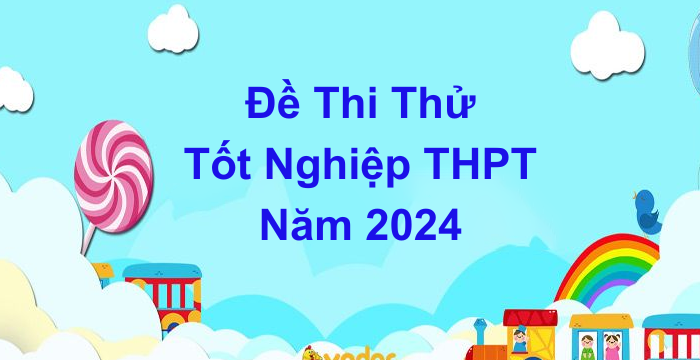Đề Thi Thử Tốt Nghiệp THPT Năm 2024 (15.05.2024) Đề 5
Thầy Thắng
ĐỀ THI THPT
15
Ngày đăng: 15-05-2024 08:40:01

ĐỀ 5 ĐỀ THAM KHẢO PHÁT TRIỂN MINH HỌA BGD 2024
KỲ THI TỐT NGHIỆP TRUNG HỌC PHỔ THÔNG NĂM 2024
Bài thi: NGOẠI NGỮ; Môn thi: TIẾNG ANH
Thời gian làm bài: 60 phút không kể thời gian phát đề
Mark the letter A, B, C, or D to indicate the word whose underlined part differs from the other three in pronunciation in each of the following questions.
Question 1. A. social B. impact C. economic D. activity
Question 2. A. issue B. wind C. image D. rice
Mark the letter A, B, C, or D to indicate the word that differs from the other three in the position of the primary stress in each of the following questions.
Question 3: A. express B. effort C. employ D. reduce
Question 4: A. preference B. attraction C. advantage D. community
Read the following passage and mark the letter A, B, C, or D to indicate the correct word or phrase that best fits each the numbered blanks.
ChatGPT: New AI chatbot has everyone talking to it
A new chatbot has passed one million users in less than a week, the project behind it says. ChatGPT was publicly released on Wednesday by OpenAI, an artificial intelligence research firm (5)_____ founders included Elon Musk. ChatGPT is the latest in a series of AIs which the firm refers to as GPTs, an acronym which (6)_____ for Generative Pre-Trained Transformer. To develop the system, an early version was fine-tuned through conversations with human trainers. The system also learned from access to Twitter data according to a tweet from Elon Musk who is no longer part of OpenAI’s board. The Twitter boss wrote that he had paused access “for now”. The results have impressed (7)_____ who’ve tried out the chatbot. OpenAI chief executive Sam Altman revealed the level of interest in the artificial conversationalist in a tweet. The project says the chat format allows the AI to answer “follow-up questions, admit its mistakes, challenge incorrect premises and reject inappropriate requests”. A journalist for technology news site Mashable who tried out ChatGPT reported it is hard to provoke the model into saying offensive things. (8)_____, OpenAI warns that “ChatGPT sometimes writes plausible-sounding but incorrect or nonsensical answers”. Training the model to be more cautious, says the firm, causes it to decline to answer questions that it can answer correctly. Briefly questioned by the BBC for this article, ChatGPT revealed itself to be a cautious interviewee (9)_____ of expressing itself clearly and accurately in English.
(https://www.bbc.com/news/technology)
Question 5: A. where B. which C. who D. whose
Question 6: A. care B. take C. stand D. look
Question 7: A. little B. few C. much D. many
Question 8: A. As a result B. Therefore C. However D. So
Question 9: A. afraid B. fond C. able D. capable
Mark the letter A, B, C, or D on your answer sheet to indicate the word(s) CLOSEST in meaning to the underlined word(s) in each of the following questions.
Question 10: There’s a feeling of accomplishment from having a job and all that goes with it.
A. involvement B. prosperity C. achievement D. contribution
Question 11: I found the movie completely engrossing from beginning to end. It’s such a pity that you haven’t seen it.
A. daunting B. interesting C. embarrassing D. shocking
Mark the letter A, B, C, or D on your answer sheet to indicate the words) OPPOSITE in meaning to the underlined word(s) in each of the following questions.
Question 12: When you’re new in a school, it’s easiest to just go with the flow for a while, and see what people are like.
A. follow the common rules B. do what other people are doing
C. follow the current trends D. do something different from other people
Question 13: Doing voluntary work is a rewarding experience.
A. beneficial B. worthwhile C. worthless D. satisfying
Mark the letter A, B, C, or D on your answer sheet to indicate the sentence that is closest in meaning to each of the following questions.
Question 14: My cousin started investing in stocks in 2018
A. My cousin has been investing in stocks since 2018
B. My cousin hasn’t invested in stocks since 2018
C. The last time my cousin invested in stocks was in 2018
D. It is the first time my cousin invested in stocks
Question 15: “You have not done your work well”, said the teacher to me.
A. The teacher told me I hadn’t done my work well.
B. The teacher told me I haven’t done my work well.
C. The teacher told me I hadn’t done your work well.
D. The teacher told me I hadn’t done his work well.
Question 16: Sally paid for her travel in advance, but it wasn’t necessary.
A. Sally couldn’t have paid for her travel in advance.
B. Sally might not have paid for her travel in advance
C. Sally needn’t have paid for her travel in advance
D. Sally may not have paid for her travel in advance
Mark the letter A, B, C or D to indicate the correct answer to each of the following questions.
Question 17. The man ____________ in the hall expected to make a phone call.
A. waiting B. was waiting C. had been waiting D. waited
Question 18. Lan is ____________ student in her class.
A. the most small B. the smallest C. the more small D. the small
Question 19. I will call and tell you something interesting _______.
A. when I come home after work B. after I had come home after work
C. before I came home after work D. while I was coming home after work
Question 20. Such approaches should be supported and mainstreamed in health interventions in order to________ positive behavior change.
A. put off B. set off C. bring about D. hold up
Question 21. Her parents rarely let her stay out late, _______?
A. do they B. don’t they C. does she D. doesn’t she
Question 22. It is _______ funniest book that I have ever read.
A. a B. an C. the D. Ø (no article)
Question 23. The discovery was a major ________ for research workers.
A. breakthrough B. breakdown C. break-in D. breakout
Question 24: I think there’s a picture of the hotel ________ the first page.
A. on B. at C. in D. to
Question 25. It’s no good ____________ to him, he never answers letters.
A. write B. written C. writing D. to write
Question 26. I tried to talk to her, but she was __________
A. as high as a kite B. as high as a house C. as high as a sky D. as high as a wall
Question 27. I _______ along the street when I suddenly heard footsteps behind me.
A. was walking B. walk C. am walking D. walked
Question 28. The young girl ______ completely on hearing of her father’s death.
A. broke down B. fell down C. turned down D. went down
Question 29. This old wooden chest _______ by my grandfather over 40 years ago.
A. built B. had built C. was built D. was building
Question 30. Delegates will meet with _____ from industry and the government.
A. represented B. representative C. representatives D. representers
Question 31. We usually do go by train, even though the car _______ is a lot quicker.
A. travel B. journey C. trip D. voyage
Mark the letter A, B, C or D to indicate the underlined part that needs correction in each of the following questions.
Question 32. She has disappeared three days ago, and they are still looking for her now.
A. has disappeared B. and C. are still D. for her
Question 33. Ozone has his origin in a number of sources, a prime one being the automobile engine.
A. his B. prime C. being D. the
Question 34: After going through a protection period that may last from several months to a year, new recruits will be offered a long-term contract.
A. going through B. protection C. last D. new recruits
Mark the letter A, B, C, or D to indicate the sentence that best combines each pair of sentences in the following questions.
Question 35. We could not handle the situation without you.
A. You didn’t help us handle the situation.
B. If you had not helped us, we could not have handled the situation.
C. If you did not help us, we could not handle the situation.
D. We will handle the situation if you help.
Question 36. I didn’t recognize my uncle. I did after he raised his voice only.
A. Not until I recognized my uncle did he raise his voice.
B. My uncle raised his voice as soon as I recognized him.
C. Only after my uncle raised his voice did I recognize him.
D. No sooner had I recognized my uncle than he raised his voice.
Mark the letter A, B, C, or D on your answer sheet to indicate the option that best completes each of the following exchanges
Question 37: Charles: “Thanks so much for looking after the children!” – Lisa: “_____.”
A. Of course, not B. That sounds nice
C. I’m fine, thanks D. That’s all right. Anytime
Question 38: Laura: “I think swimming helps us exercise all our muscles” - David: “_____.”
A. There is no doubt about it B. You can do it. Thanks anyway
C. Not at all. You can make it D. Yes, swimming does, too
Read the following passage and mark the letter A, B, C, or D on your answer sheet to indicate the correct answer to each of the questions.
As any student can tell you, sometimes it takes a lot of work and effort to commit information to memory before a big exam. However, some other events, details, and experiences enter our memory with little or no effort. For example, you might hear a catchy song on the radio once and still remember its tune days or weeks later. So why does it seem like some things are so difficult to remember and other things so easy? What’s the difference?
When you’re trying to intentionally remember something (like a formula for your statistics class or a list of dates for your history class), this information is stored in your explicit memory. People use these memories every day, from remembering information for a test to recalling the date and time of a doctor’s appointment. There are two types of explicit memory: episodic memory, which is your long-term memories of specific events, like what you did yesterday or your high school graduation, and semantic memory, which is memories of facts, concepts, names, and other general knowledge.
Things that people don’t have to purposely try to remember are stored in implicit memory. This kind of memory is both unconscious and unintentional. Some examples of implicit memory include singing a familiar song, typing on your computer keyboard, and brushing your teeth. Riding a bike is another example. Even after going years without riding one, most people who have already learned how to ride a bike are able to hop on and ride it effortlessly without thinking consciously.
These two major types of memory play important roles in shaping your ability to recall pieces of information and interact with things in your environment. Knowing some of the major differences between them is important for understanding how memory works.
(Adapted from verywellmind.com)
Question 39: What is the passage mainly about?
A. The role of explicit and implicit memory B. The different types of memory
C. Episodic memory and semantic memory D. How to have a better memory
Question 40: Which of the following is an example of semantic memory?
A. Remembering about what you ate for lunch yesterday.
B. Remembering about the date of an important historical event.
C. Remembering about the first time you travel abroad
D. Remembering about your experience at a traditional festival.
Question 41: The word “purposely” in paragraph 3 is closest in meaning to __________.
A. easily B. decisively C. deliberately D. freely
Question 42: Which of the following is TRUE, according to the passage?
A. It is always very hard for students to learn information to take exams.
B. People use explicit memory mostly for remembering specific events.
C. Implicit memories can be recalled without conscious effort.
D. Humans can remember any song they hear unintentionally.
Question 43: The word “them” in paragraph 4 refers to ___________.
A. types of memory B. important roles
C. pieces of information D. things in environment
Read the following passage and mark the letter A, B, C, or D on your answer sheet to indicate the correct answer to each of the questions
While watching sports on TV, the chances are children will see professional players cheating, having tantrums, fighting, or abusing officials. In addition, it’s highly likely that children will be aware of well-known cases of sportspeople being caught using drugs to improve their performance. The danger of all this is that it could give children the idea that winning is all that counts and you should win at all costs. Good behavior and fair play aren’t the message that comes across. Instead, it looks as if cheating and bad behavior are reasonable ways of getting what you want. This message is further bolstered by the fact that some of these sportspeople acquire enormous fame and wealth, making it seem they are being handsomely rewarded either despite or because of their bad behavior.
What can parents do about this? They can regard sport on television as an opportunity to discuss attitudes and behavior with their children. When watching sports together, if parents see a player swearing at the referee, they can get the child’s opinion on that behavior and discuss whether a player’s skill is more important than their behavior. Ask what the child thinks the player’s contribution to the team is. Point out that no player can win a team game on their own, so it’s important for members to work well together.
Another thing to focus on is what the commentators say. Do they frown on bad behavior from players, think it’s amusing or even consider it’s a good thing? What about the officials? If they let players get away with a clear foul, parents can discuss with children whether this is right and what effect it has on the game. Look too at the reactions of coaches and managers. Do they accept losing with good grace or scowl and show a bad attitude? Parents can use this to talk about attitudes to winning and losing and to remind children that both are part of sport.
However, what children learn from watching sports is by no means all negative and parents should make sure they accentuate the positives too. They should emphasize to children the high reputation that well-behaved players have, not just with their teammates but also with spectators and the media. They can focus on the contribution made by such players during a game, discussing how valuable they are in the team. In the interviews after a game, point out to a child that the well-behaved sportspeople don’t gloat when they win or sulk when they lose. And parents can stress how well these people conduct themselves in their personal lives and the good work they do for others when not playing. In other words, parents should get their children to focus on the positive role models, rather than the antics of the badly behaved but often more publicized players.
Question 44: The word “accentuate” in paragraph 4 can be best replaced by _____ .
A. consolidate B. embolden C. actualize D. highlight
Question 45: According to paragraph 2 what should parents teach their children through watching sports?
A. A player’s performance is of greater value than his behavior.
B. Cheating is frowned upon by the majority of players.
C. A team with badly-behaved players will not win a game.
D. Collaboration is fundamental to any team’s success
Question 46: Which of the following about sport is NOT mentioned in the passage?
A. Misconduct from sportspeople may go unpunished despite the presence of officials.
B. Reactions of coaches and managers when their teams lose a game may be of educational value.
C. Many sports people help others so as to project good images of themselves
D. A well-behaved player enjoys a good reputation among his teammates, spectators and the media.
Question 47: The word “bolstered” in paragraph 1 is closest in meaning to _____.
A. energized B. reinforced C. inspired D. represented
Question 48: The word “They” in paragraph 4 refers to _____.
A. parents B. teammates C. children D. spectators
Question 49: Which of the following does the passage mainly discuss?
A. The influence of model sportspeople on children
B. Moral lessons for children from watching sports
C. Different attitudes toward bad behavior in sport
D. The importance of team spirit in sport
Question 50: According to paragraph 1, misconduct exhibited by players may lead children to think that _____.
A. it is necessary in almost any game
B. it is disadvantageous to all concerned
C. it is an acceptable way to win the game
D. it brings about undesirable results
—THE END—
Giải đáp mọi thắc mắc trong đề - mua bản word và đáp án chi tiết vui lòng liên hệ Zalo: 034 8371 758
Theo dõi fanpage để cập nhật nhanh các bài tập và đề kiểm tra mới nhất.
https://www.facebook.com/profile.php?id=61555984765050
Bài Viết Liên Quan

Đề Thi Thử Tốt Nghiệp THPT 2025 (27.05.2025)

Đề Thi Thử Tốt Nghiệp THPT 2025 (03.04.2025)

Đề Thi Thử Tốt Nghiệp THPT 2025 (02.04.2025)

Đề Thi Tốt Nghiệp THPT Năm 2024

Đề Thi Thử Tốt Nghiệp THPT Năm 2024 (29.05.2024) Đề 19

Đề Thi Thử Tốt Nghiệp THPT Năm 2024 (28.05.2024) Đề 18

Đề Thi Thử Tốt Nghiệp THPT Năm 2024 (27.05.2024) Đề 17

Đề Thi Thử Tốt Nghiệp THPT Năm 2024 (25.05.2024) Đề 16

Đề Thi Thử Tốt Nghiệp THPT Năm 2024 (24.05.2024) Đề 15

Đề Thi Thử Tốt Nghiệp THPT Năm 2024 (24.05.2024) Đề 14

Đề Thi Thử Tốt Nghiệp THPT Năm 2024 (23.05.2024) Đề 13

Đề Thi Thử Tốt Nghiệp THPT Năm 2024 (23.05.2024) Đề 12

Đề Thi Thử Tốt Nghiệp THPT Năm 2024 (22.05.2024) Đề 11

Đề Thi Thử Tốt Nghiệp THPT Năm 2024 (22.05.2024) Đề 10

Đề Thi Thử Tốt Nghiệp THPT Năm 2024 (20.05.2024) Đề 9

Đề Thi Thử Tốt Nghiệp THPT Năm 2024 (20.05.2024) Đề 8

Đề Thi Thử Tốt Nghiệp THPT Năm 2024 (17.05.2024) Đề 7

Đề Thi Thử Tốt Nghiệp THPT Năm 2024 (16.05.2024) Đề 6

Đề Thi Thử Tốt Nghiệp THPT Năm 2024 (09.05.2024) Đề 4

Đề Thi Thử Tốt Nghiệp THPT Năm 2024 (08.05.2024) Đề 3

Đề Thi Thử Tốt Nghiệp THPT Năm 2024 (05.05.2024) Đề 2

Đề Thi Thử Tốt Nghiệp THPT Năm 2024 (03.05.2024) Đề 1

Đề Thi Thử Tốt Nghiệp THPT Năm 2024 (09.04.2024)

ĐỀ THI THAM KHẢO KỲ THI TỐT NGHIỆP TRUNG HỌC PHỔ THÔNG NĂM 2023 (05.04.2024)

Đề Thi Thử Tốt Nghiệp THPT Năm 2024 (05.04.2024)

Đề Thi Thử Tốt Nghiệp THPT Năm 2024 (1.04.2024)

Đề Thi Thử Tốt Nghiệp THPT Năm 2024 (1.04.2024)

ĐỀ THI THAM KHẢO KỲ THI TỐT NGHIỆP TRUNG HỌC PHỔ THÔNG NĂM 2024 (22.03.2024)

Đề Thi Thử Tốt Nghiệp THPT Năm 2024 (15.03.2024)

Bài Đăng Gần Đây

Đề Cương Ôn Tập Giữa Học Kì 2 Tiếng Anh Lớp 7 Global Success (24.02.2026)

Đề Kiểm Tra Giữa Kì 2 Tiếng Anh Lớp 7 Global Success (3.2.2026)

Đề Kiểm Tra Cuối Kì 1 Tiếng Anh Lớp 10 Global Success (02.01.2026)

Đề Cương Ôn Tập Cuối Học Kì 1 Tiếng Anh Lớp 8 Global Success (30.12.2025)

